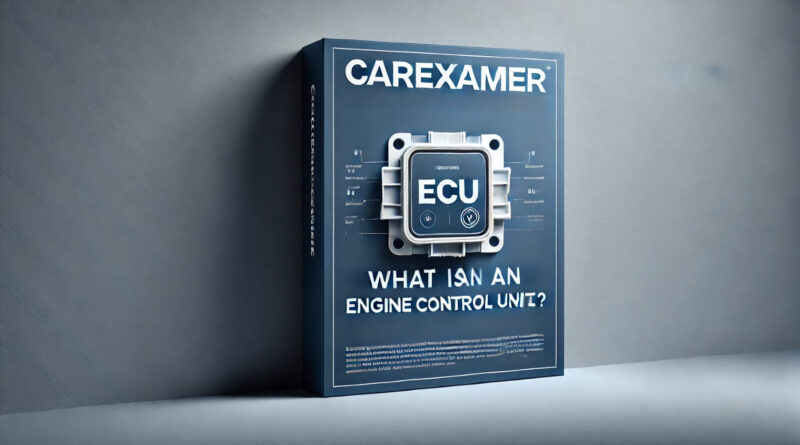What Is an Engine Control Unit (ECU)? The Brain Behind Your Car
Let’s break it down what is an engine control unit (ecu) in simple terms so you can understand what it does, how it works, and why it’s so important. Ever wonder what keeps your car running smoothly, delivering power when you need it, and sipping fuel efficiently? It’s all thanks to the Engine Control Unit (ECU)—the unsung hero that works tirelessly behind the scenes. Often called the “brain” of the car, the ECU is a small but powerful computer that monitors and adjusts the engine’s performance in real time.
What Is It?
The Engine Control Unit is the high-tech control center of your car’s engine. It gathers data from sensors spread across the engine, processes this information, and adjusts key settings like fuel delivery and ignition timing.
In short, it’s the reason your car starts, accelerates smoothly, and doesn’t guzzle gas like there’s no tomorrow.
How Does it Work?
Think of the ECU as a multitasking genius. Here’s how it operates:
1. It Listens to Sensors
The ECU gathers real-time data from various parts of the engine using sensors like:
- Oxygen Sensors: Measure how much oxygen is in the exhaust to fine-tune the air-fuel mixture.
- Throttle Position Sensor: Tracks how far you’ve pressed the accelerator.
- Temperature Sensors: Monitor engine and air temperatures to keep things from overheating.
- Crankshaft Sensor: Measures engine speed and position to control timing.
2. It Thinks
Once the data comes in, the ECU processes it using pre-programmed algorithms. It’s like having a super-quick decision-maker constantly figuring out how to make your engine run better.
3. It Acts
Based on the data, the ECU sends commands to adjust things like:
- How much fuel is injected into the engine.
- When the spark plugs fire for ignition.
- How fast the engine idles.
It’s a constant cycle of listening, thinking, and acting to keep your car performing at its best.
What Does the ECU Actually Do?
The ECU has its hands (or circuits) in just about every part of your engine’s operation. Here’s what it controls:
1. Fuel Injection
The ECU decides how much fuel to spray into the engine cylinders for the perfect balance of power and efficiency.
2. Ignition Timing
It ensures the spark plugs fire at just the right moment to get the most out of the air-fuel mixture.
3. Emissions Control
By managing combustion, the ECU helps your car meet environmental standards and reduce pollution.
4. Idle Speed
The ECU adjusts the engine’s idle speed based on conditions like temperature and load, so your car doesn’t stall or feel rough when stationary.
5. Troubleshooting
If something goes wrong, the ECU stores error codes that mechanics can use to figure out what’s causing the problem.
Why Is the ECU So Important?
Modern cars wouldn’t be the same without the ECU. Here’s why it’s such a big deal:
1. Smooth Performance
The ECU makes sure your car runs smoothly, whether you’re cruising on the highway or stuck in traffic.
2. Better Fuel Economy
By optimizing fuel delivery, the ECU helps you get more miles per gallon.
3. Lower Emissions
It keeps your car running clean by controlling combustion and meeting strict environmental regulations.
4. Adaptability
From hot summers to freezing winters, the ECU adjusts to ensure your car performs well in any condition.
What Can Go Wrong with an ECU?
Even though ECUs are built to last, they’re not immune to problems. Here are some common issues:
- Faulty Sensors: If a sensor sends incorrect data, the ECU might make bad adjustments, affecting engine performance.
- Software Issues: Outdated or corrupted software can lead to misfires or poor fuel efficiency.
- Physical Damage: Water, heat, or electrical surges can damage the ECU, sometimes requiring a replacement.
- Check Engine Light: A malfunctioning ECU often triggers the Check Engine Light, signaling something’s off.
How to Take Care of Your ECU
Keeping your ECU in good shape isn’t hard. Here’s how:
- Stay on Top of Maintenance: Regular oil changes and tune-ups keep the engine and sensors working correctly.
- Protect Against Water Damage: Avoid driving through deep water to protect your car’s electrical components.
- Update Software if Needed: Some manufacturers release updates to improve ECU performance—don’t skip these.
- Pay Attention to Warning Lights: If the Check Engine Light comes on, don’t ignore it. Get it checked out ASAP.
The Future of ECUs
As cars become more advanced, ECUs are taking on even bigger roles. Hybrid and electric cars rely on ECUs to manage battery performance and electric motors, while autonomous vehicles use them to process data from sensors for self-driving features.
In the future, ECUs will likely integrate AI, over-the-air updates, and even more advanced diagnostic capabilities, making cars smarter and more efficient than ever.
Final Thoughts
The Engine Control Unit (ECU) is like the mastermind of your car’s engine. It’s constantly working to ensure everything runs smoothly, efficiently, and cleanly. From saving you fuel to keeping your engine in peak condition, the ECU plays a vital role in making modern driving reliable and enjoyable.
So, the next time you hit the road, remember: it’s not just the engine doing the work—it’s the ECU making sure everything happens just right.
Buying a used VW. Buying used vauxhall, BMW, Jaguar, Ford, Volvo, Range rover, Bentley, Aston Martin, Porsche, Ferrari, Lamborghini, Maserati, Hyundai, Tesla, Honda, Pagani

